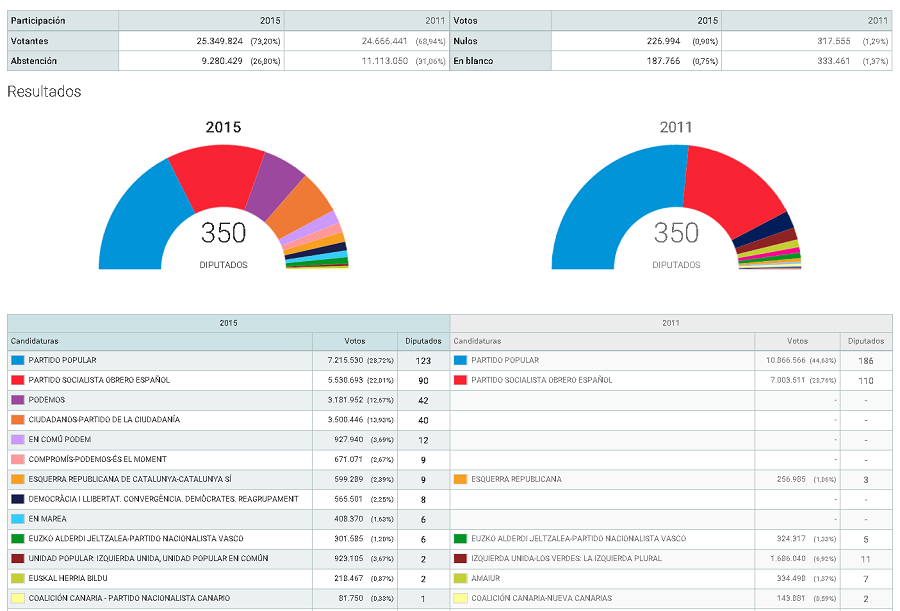New parties win big in Spain election, ruling conservatives lose majority
Spain’s ruling People’s Party (PP) won 123 seats in the national parliament, but lost an absolute majority to an expected left-wing block including the Socialist Party (90 seats) and anti-austerity Podemos (42/69 seats). PP said it will try to form a government.
Since Podemos is affiliated with a number of regional electoral coalitions, which have different names in different regions, alternative counts give the number of seats they have secured as 69. This includes 12 seats from Catalonian En Comú Podem, 6 seats from Galician En Marea, and 9 more seats from the Compromís-Podemos-És el moment coalition in Valencia.
The leader of Podemos party Pablo Iglesias told his supporters that this is a “historic” day for Spain, as it ushers in a new political era.
“Today is a historic day for Spain... We are starting a new political era in our country,” Iglesias said. “Spain is not going to be the same anymore.”

Prime Minster Mariano Rajoy’s conservative Partido Popular (PP) party still took the largest share of the votes, though it will lose its parliamentary majority when the results of its left-wing rivals are combined.
"PP is the strongest force and the one chosen by the Spanish people," said its spokesman at a press conference, as the exit polls were announced. The party captured 44 percent of the vote in the last election in 2011.
El PP pierde 3,8 millones de votos y más de 60 escaños en cuatro años https://t.co/Qp4SBpqqq7pic.twitter.com/PoGtXF4qrP
— eldiario.es (@eldiarioes) December 20, 2015The year-old Cuidadanos, considered a reformist, pro-business party, came in fourth place with 40 seats.
"The two-party political system is over and we are entering a new era in our country," said Podemos's deputy Inigo Errejon.
Voter turnout was 71 percent, two percentage points higher than in the previous election.
A total of 176 seats are necessary to win a majority in Spain’s 350-seat chamber of deputies, meaning that PP, predicted to have 124 deputies at most, will have to strike a deal with one of the runners-up to remain in power.
It should be the party with the most seats – the People’s Party – that should try to form the government first, the leader of the Socialist Party Pedro Sanchez said. He added that people have voted “for the left and for change.”
Spain’s acting prime minister, Mariano Rajoy, told his supporters in Madrid that he will try to form a government, adding that it will not be an easy task as none of the parties had received a clear majority.
Follow the live counting of the spanish election #MiVotoCuentahttps://t.co/dRPqyExUWopic.twitter.com/sMgg4pUd37
— Luis Sevillano (@sepirdata) December 20, 2015Meanwhile, the new pro-market Ciaudadanos party’s leader, Albert Rivera, said he wants to play a key role in forming a majority government in Spain. “We will be decisive in forming a majority administration that will be able to change this country,” Rivera stated.
Ciudadanos is likely to support the People’s Party, as it considered center-leaning.
Both Cuidadanos and Podemos have painted themselves as protest parties, unwilling to be a part of the old political order, with its baggage of corruption and economic hardship. Spanish wages have still not recovered to 2008 levels despite years of austerity implemented by both the Socialists and PP. Unemployment is at 21.6 percent - gradually falling, but still the second-highest in the EU after Greece.
How the conversation on Twitter about the #SpanishElections currently looks https://t.co/cXL8mk7j9y#ELPAÍS20Dpic.twitter.com/dZAwNmmRQI
— El País in English (@elpaisinenglish) December 20, 2015It is possible that Podemos and the Socialists will unite to form a left-wing coalition, though Rajoy said he would attempt to prevent this at all costs.
The balance was tipped in favor of the left-wing parties when Podemos received an unexpected boost from voters, helping to bring the total seat count for all the left-wing parties combined to over 170. For a majority government, the parties will need to put together 176 seats.
There are no specific rules stipulating how or when the new government must be sworn into office, and deputies could call for a new vote, if no consensus is reached.
Since Spain’s transition to democracy, following General Franco’s death in 1975, there has never been a coalition government. Without outright majorities, biggest parties have relied on support from minor factions on individual votes.
El Partido Popular la fuerza más votada, España me recuerda a esto. #L6eleccionespic.twitter.com/yQdyiIomgr
— IGGY AZOTEA٭ (@Abel_Kills) December 20, 2015











